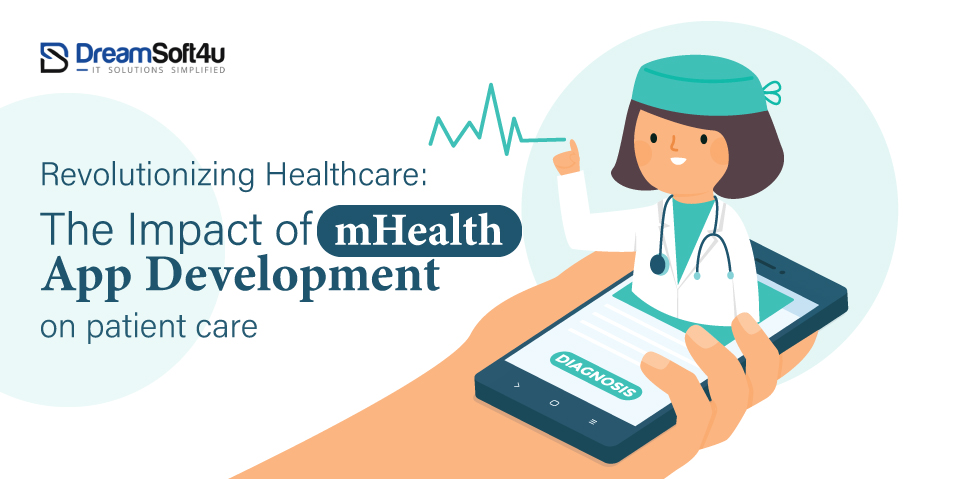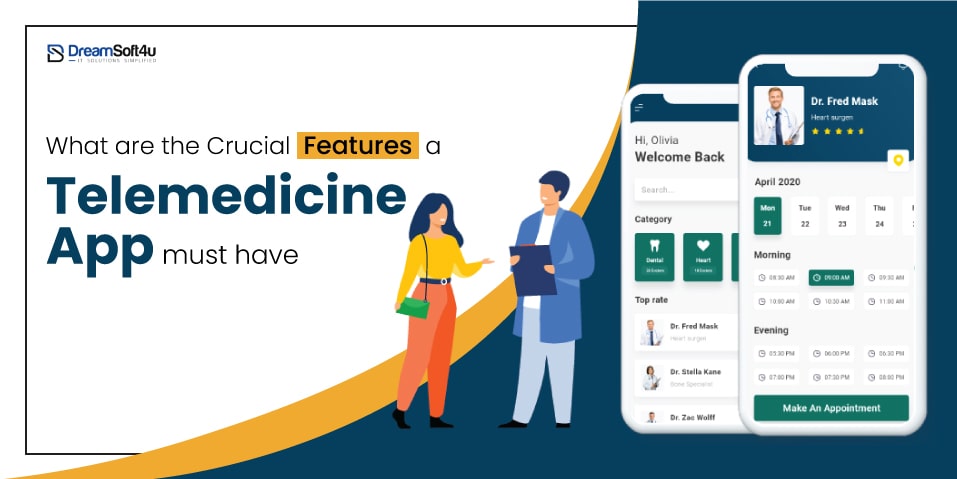Imagine having medication reminders, vital sign tracking, and virtual consultations right on your phone. mHealth apps are giving people the tools to manage their health with personalized and easy-to-access services. These apps are becoming essential for patients and providers to deliver great patient care. Join us as we dive into how mHealth app development is changing the game for providers, clinics, and hospitals.
Table of Contents
ToggleWhat exactly are mHealth applications?
mHealth applications are mobile applications designed to support and enhance healthcare delivery. They offer features such as medication reminders, vital sign tracking, and virtual consultations, providing accessible and personalized healthcare services through smartphones. The global mobile health market was projected to reach over $250 billion by 2032, with millions of users relying on mHealth apps for managing health and wellness.
Benefits of mHealth App Development for Patient Care:
Access Anytime, Anywhere: Schedule appointments, check medical records, and get personalized health info on the go, enhancing patient satisfaction.
Promoting Preventive Care: Fitness tracking, nutrition guidance, and mental health support encourage proactive well-being management, preventing chronic diseases.
Remote Patient Monitoring: Integrating wearable devices and sensors allows healthcare providers to monitor vital signs remotely, ensuring prompt intervention and reducing burdens on healthcare facilities.
Trends and Statistics in Healthcare App Development
Booming Market: Recent stats predict the global healthcare app market to hit USD 800 billion by 2030, fueled by the surging demand for innovative digital health solutions.
AI Integration: A rising trend is integrating AI and machine learning into healthcare apps for advanced diagnostics and personalized treatment plans. AI-powered apps analyze vast healthcare data, offering valuable insights for patients and providers.
Telemedicine Revolution: Telemedicine and virtual care are transforming healthcare. Developers are making platforms for easy virtual check-ups, remote monitoring, and telehealth services. This change sped up during COVID-19, showing how important mHealth apps are for non-stop care.
Factors to Consider in mHealth App Development
When embarking on mHealth app development, several critical factors need to be taken into consideration to ensure the success and effectiveness of the app. Key points in mHealth App Development:
UX Design Matters:
- Intuitive and user-friendly interfaces are crucial for engaging and retaining app users.
- Seamless navigation and accessibility maximize usability, catering to a diverse user base.
Security is Non-Negotiable:
- Given the sensitive nature of healthcare data, stringent data protection measures are essential.
- Adherence to regulations like HIPAA is imperative for safeguarding patient information and maintaining confidentiality.
Interoperability and Integration:
- mHealth apps must seamlessly connect with existing healthcare systems and electronic health records (EHRs).
- Interoperability ensures the exchange of vital patient information, promoting coordinated care among healthcare providers for improved efficiency and continuity of patient care.
Read Also: Mastering Advanced Healthcare Apps: A Comprehensive Guide for Mobile App Developers
The Process of Developing a Healthcare App
The process of developing a healthcare app involves a series of meticulous steps to ensure the app’s functionality, usability, and relevance in the healthcare domain.
Research and Analysis:
- Understand specific healthcare needs and challenges.
- Identify target audience preferences to shape app features.
Planning and Conceptualization:
- Strategically plan app structure, features, and user interface.
- Collaborate with healthcare professionals, UX designers, and developers for reliability and usability.
Development Phase:
- Code, test, and iterate for performance and compatibility.
- Rigorous testing for usability, security, and interoperability.
- Involve healthcare stakeholders in testing to validate real-world effectiveness before launch.
Key Features of Successful mHealth Apps
Successful mHealth apps are distinguished by their comprehensive features that cater to the diverse healthcare needs of patients and healthcare providers. Here’s a simplified breakdown:
Personal Health Records (PHR) Integration:
- Store and access medical history, reports, and treatment plans securely.
- Helps in making informed decisions and ensures continuity of care.
Medication Management:
- Includes reminders, dosage tracking, and prescription refill alerts.
- Boosts medication adherence, reducing the risk of errors, especially for chronic conditions.
Telemedicine and Virtual Consultations:
- Connect with healthcare professionals for remote diagnosis and advice.
- Perfect for follow-up consultations, enhancing access to healthcare, especially for those with limited mobility or in remote areas.
Data Security Measures:
- Strict protocols to ensure the security of patient data.
- Measures are in place to protect against unauthorized access and data breaches.
Compliance with Regulations:
- Adherence to healthcare regulations, such as HIPAA.
- Ensures the app meets legal standards, safeguarding patient information.
User-Friendly Privacy Controls:
- Clear privacy settings for users to control their data.
- Ensures transparency and empowers users to manage their information securely
Healthcare App Development Cost: What You Need to Know
Alright, let’s talk costs of making those cool healthcare apps. Developing an mHealth app involves some serious cash considerations. Here are the key ones:
Scope Matters:
- The bigger the plan, the more it might cost.
- Think about features, complexity, and how much you want to pack into your app.
Development Time:
- Time is money, my friend.
- More complex apps take longer to build, and time means dollars.
Tech and Features:
- Fancy tech and extra features can bump up the bill.
- Consider what’s essential and what’s nice to have.
Design and User Experience:
- A sleek design and user-friendly experience don’t come cheap.
- But they’re crucial for keeping users hooked.
Testing and Tweaking:
- Bugs are the enemy, and fixing them takes time and money.
- Plan for testing and refining your app.
Post-Launch Maintenance:
- It’s not over once the app is out.
- Budget for updates, fixes, and keeping things smooth.
So, the bottom line, the cost of making a mHealth app is a mix of how big, how fancy, and how smooth you want it. It’s an investment, but a good app is worth its weight in gold.
Ready to dive into the world of healthcare app development?
Let’s talk about making your idea a reality!
Choosing the Right App Development Company for Healthcare Apps
Choosing healthcare software development companies is a big deal—it can make or break the success of your app.
Track Record Matters:
Check if the company has delivered secure and user-friendly healthcare solutions before. Experience and a good grasp of healthcare regulations are crucial for successful mhealth app development.
Teamwork is Key:
Look for a company that collaborates with healthcare experts—doctors, IT professionals, and patient advocates. Teamwork ensures the app aligns with real-world healthcare needs and follows the best clinical practices.
Communication is Crucial:
Effective communication between developers and healthcare experts is vital for a tailored and clinically validated MHealth app. A well-working team leads to an app that truly meets healthcare requirements.
Proven Success:
Check the company’s history of successful healthcare app projects. Client testimonials provide insights into the company’s work and solutions’ quality.
Expertise Check:
Ensure the company is proficient in user experience design, security, and interoperability standards. Expertise in these areas is essential for reliable and top-quality mHealth app development.
Remember, it’s not just about choosing an app developer; it’s about finding a dependable partner for your mHealth app journey.
Future of mHealth App Development
The future of mHealth apps is looking pretty awesome! They’re getting all fancy with new tech and stuff because, you know, healthcare needs are changing. One cool thing coming up is putting virtual reality (like what you use for games) and augmented reality into these apps. It’s not just for fun – it’s making learning about your health, rehab, and surgeries super interactive.
But wait, there’s more! mHealth apps are teaming up with smartwatches and sensors. It’s not just about counting steps; these apps will keep an eye on your heart rate, how much you move, and other body stuff. It’s like having your health info right there, all the time.
And guess what? Mental health is getting a big thumbs-up too. These apps are going beyond just physical health – they want to help with your mind. Think therapy exercises, staying chill with mindfulness, and keeping tabs on your moods. They’re gearing up to be your pals, cheering you on for good mental vibes. So, yeah, exciting times ahead!
Conclusion
So, wrapping it up, mHealth apps are changing the healthcare game. They’re bringing in a whole new era of healthcare – think accessible, personalized, and super efficient. These apps aren’t just for making life easier; they’re making patients healthier, improving preventive care, and getting people more into their health.
What’s next for mHealth apps? Well, tech will keep doing its thing, user-friendly designs will stay a top priority, and healthcare and tech folks will keep teaming up. The future looks like it’s all about breaking down limits in healthcare access and giving patients and providers more power.
FAQs
Q. What healthcare software development services do you offer?
- Custom Healthcare App Development
- Electronic Health Record (EHR) System Development
- Telemedicine Solutions
- Health Information Exchange (HIE) Development
- Medical Imaging Software
- mHealth App Development
- Healthcare Analytics Solutions
- Compliance and Security Solutions
- Integration with Wearable Devices
- User Experience (UX) Design
Q. What technologies are commonly used in mHealth app development?
- Programming languages like Swift (for iOS) and Kotlin/Java (for Android).
- Database systems such as Firebase or SQLite.
- Integration of frameworks like React Native or Flutter for cross-platform development.
- Implementation of APIs for data exchange.
Q. How long does it typically take to develop a mHealth app?
The development time varies based on complexity and features. Simple apps may take a few months, while more complex ones could take a year or more. Factors like design, testing, and regulatory compliance contribute to the timeline.
Q. What team composition is ideal for mHealth app development?
A typical team includes project managers, UI/UX designers, mobile app developers, backend developers, QA testers, and, if necessary, healthcare domain experts. The size depends on the project’s scope and complexity.
Q. How do you ensure data compliance, especially regarding patient information?
- Adherence to data protection regulations like HIPAA is non-negotiable.
- Implement strict data encryption protocols.
- Regularly audit and update security measures to stay compliant.
Q. What steps are taken to ensure the security of patient data in mHealth apps?
- Strict access controls to limit data access to authorized personnel.
- Regular security audits and vulnerability assessments.
- Implementation of secure communication channels and encryption methods.



















